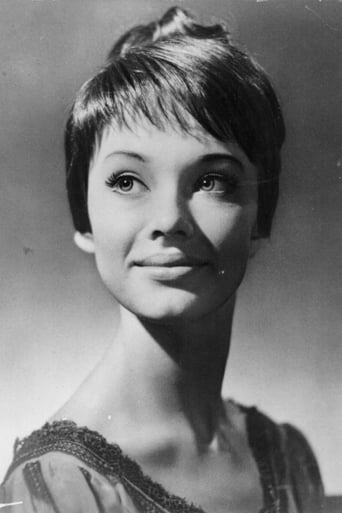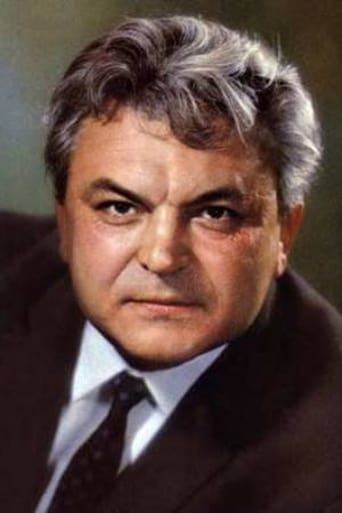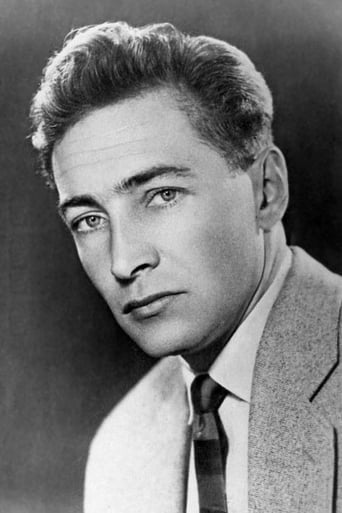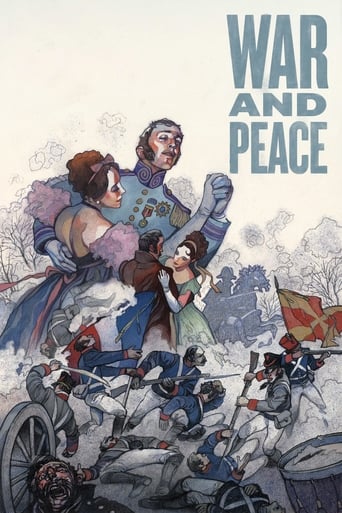
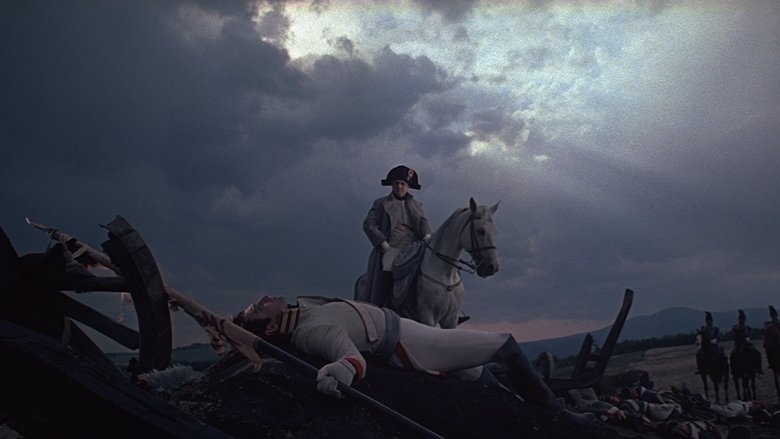
War and Peace (1966)
A seven-hour epic adaptation of the novel by Leo Tolstoy. The love story of young Countess Natasha Rostova and Count Pierre Bezukhov is interwoven with the Great Patriotic War of 1812 against Napoleon's invading army.
Watch Trailer
Cast


Reviews
Sadly Over-hyped
Absolutely Fantastic
Fun premise, good actors, bad writing. This film seemed to have potential at the beginning but it quickly devolves into a trite action film. Ultimately it's very boring.
The movie's neither hopeful in contrived ways, nor hopeless in different contrived ways. Somehow it manages to be wonderful
I tried to tackle Tolstoy's "War and Peace." I'd read "Anna Karenina" as a teen and found it interesting. And I positively enjoyed "Crime and Punishment" later in life -- an AXE MURDER! But "War and Peace" was simply too big. Natasha is a doll-like figure resembling Audrey Hepburn, with her long neck, slender figure, wide eyes, and fragile features. She's elfin with a touch of the Tatar brush. She looks as if you could take one of her long bones and snap it like a twig. Only her lips are plumper than Hepburn's, suggesting she is prepared to be debauched more thoroughly than Audrey Hepburn ever was.Still, she looks like an adolescent throughout, and has an adolescent's impatient, flighty notion of love. She pines for Prince Andre and he finally proposes, but there is no formal engagement, and he tells her he will spend a year away to give her time to think. She thinks. Then she leaps headlong into a glandular love with some already-married Schmuck who tries to sweep her away and ruin her. She's eager but her family prevents it. The Battle of Borodino, a Russian victory that didn't save Moscow, is long, action filled, gory, smoky, hard on horses, and confusing. Half the time I couldn't tell who was who. Andre is in the midst of the fighting, and Pierre is covered with mud while observing, but it was possible to identify the French in long shots only because their headgear had a kind of plume sticking straight up, and in close ups their blue blouses could be clearly seen. I said that it's hard on horses because of the obvious use of a device called the "running W". Wires were attached to the horse's front legs and the horse was made to gallop until the wire ran out to its full length, yanking the horse's legs out from under him.It's extremely impressive. At any given time there may be literally hundreds of soldiers galloping, marching, or running across the screen amid the racket and puffs of exploding shells, often in aerial shots. But it's impossible to follow the developments. It's all done by editing or montage, rather than from a particular individual's point of view. I'd contrast it with a much briefer and equally effective, studio-bound scene of combat from "Pride of the Marines." In some ways the most harrowing scenes are those of executions, not battles. We get to know a little about the people being tied helplessly to the stake, blindfolded, and shot. In battle you can defend yourself, but this is murder. Bondarchuk, the director, has given himself the part of Pierre, a nice sympathetic role, but he doesn't try to become a matinée idol. How could he? He looks like James Coco. He has a fine scene in which he has a duel with some smart aleck and almost by accident shoots the fellow in the ribs, after which, filled with guilt, he runs drunkenly through the snowy woods, stumbling over everything.The night before Borodino, Andre and Pierre have a chat in Andre's dark cabin. Andre is full of misgivings about tomorrow, certain he will be killed. And he rhetorically asks some simple questions. Tomorrow hundreds of thousands of men will try to butcher one another and he, Andre, will be among the most enthusiastic. The side that kills the most will be the winner. But everyone, soldier and civilian alike, will suffer. If God is good, how can He allow all this crap to continue? It's a conundrum that has no satisfactory answer although most world religions have been at pains to find one. Christianity decided that God gave man free will as a kind of test. He can create evil if he likes. In other Eastern religions, suffering is working off some bad karma leading to redemption in the next life. But Andre never answers his own question. He's just perplexed by it all.A lusty theme of nationalism runs through the film. The narration tells us about the role of the Russian spirit in turning Napoleon away from Moscow. It's believable enough. In what the Russians call "The Great Patriotic War" and we call "World War II", it's doubtful that many involved were fighting for Josef Stalin. I found the narration a bit much, rather like Basil Rathbone's patriotic platitudes at the end of his Sherlock Holmes movies. But there is a warm little scene at the time of the wolf hunt. In a humble wooden cottage, after a simple meal, a servant in the next room is playing a balalaika and the patriarch at the table takes up his guitar and begins to play an unpretentious ballad. He begs Natasha to dance and she holds her skirt wide and glides from place to place with tiny graceful movements. The tempo picks up and she spins madly and joyously. Afterward the old man applauds and wonders how -- what with her French nanny and her cosmopolitanism -- Natasha could still be so aglow with Russianism. The later part of the film gets all spiritual, as Tolstoy himself did.Its most pronounced attribute is its length. It's a longie. It goes on and on and on. It's like driving through Texas. And it still fails to cover all the text. There's nothing about Pierre's experimentation with the Masons, for instance. I don't know what it was about the Napoleonic wars but Russian General Bagration, who became a hero at the Battle of Austerlitz, had a salad named after him. No kidding. You can look up the recipe easily. And then, of course, Napoleon is a creamy pastry and Beef Wellington is roasted in a pastry shell. Something about food and the French, I expect. A Gallic influence seems to be everywhere. And now, please excuse me as I warm my baguette over the bidet.
I watched the subtitled version, so I felt the acting was somewhat stilted at times, I chalked that up to not understanding the Russian language. Moral censorship of the times is evident, including the times of the writer so the unspoken "sins" are pretty well disguised. The ball room scenes are beyond impressive,and I liked that they took time to film these. All and all, I was impressed...but, the battle scenes were so disappointing. They had a large portion of the Russian army to stage these great battles and just when the magnitude of the battle was being presented, the director thought: "let's have the camera go into double exposure, and swirl one scene around another like they do in America on that show, Hullabaloo!!" What were they thinking!! That camera technique is idiotic and it should have been recognized,even at that time, as idiotic. They could have given a lesson in Napoleonic Era strategy and tactics. Along with showing what a colossal waste war is. But it appeared they wanted it to be "groovy" instead. I would like to see this story retold today. Stay with the book as this is, don't add anything, but imagine the battle scenes and what could be done. (think Lord of the Rings and not drivel like, 300) Just an opinion...
Having read the novel and seen the full version just now, in one sitting, in a theater (Film Forum in NYC), it is an incomparable experience and one of the two or three best novel-adaptations ever made. The cinematography and set-pieces are phenomenal (the budget was $700 million) and the story of course is one of history's greats.Some stuff from the novel gets cut, and the "war" scenes are far more memorable than the "peace" parts, but the entire "Part Two," which focuses entirely on Natalie, would be a great romantic film entirely to itself.In short, it is like "The Leopard," "Gone with the Wind," Abel Ganz' "Napoleon," and "Spartacus" rolled into one masterpiece. However, I don't know that one could sit through this on DVD. But if you don't live in NY this week, I don't know when else you will have the chance to see it on the big screen, where it really is jaw-dropping.
After one finishes viewing it, and only afterward, one realizes that this movie cannot be made. This movie was there all the time, always. It only requested a camera, like some smoke lamp that visualizes an invisible laser beam. It is like carving away chunks of darkness to reveal the light inside. And after all the efforts to come to terms with the reality one realizes that this movie cannot be seen: too deep, too wide, too high, too vast, too beautiful, too painful. In the end, it strikes you with the most hard and harsh of them all questions that cannot be asked, but only answered: the deepest sense of joy of life comes from the simplest acknowledgment of the joy of being in life. This, and only this can explain why sheer opulence replaces the ascetic simple beauty in Andrei Rublev.


